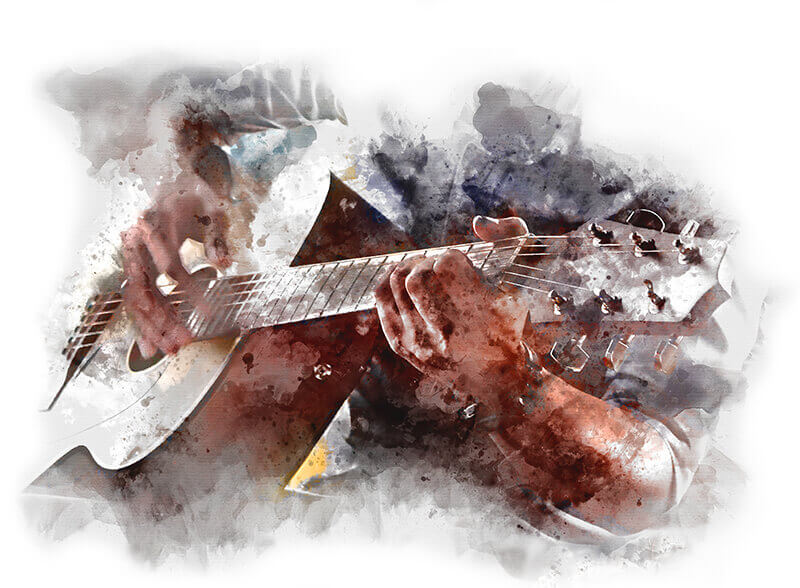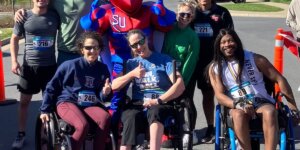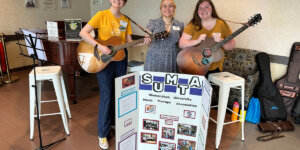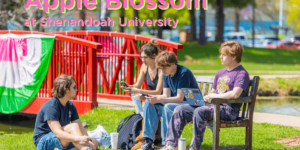Shenandoah University student Sara Woodward is helping to fine tune the mobility and memory of older adults through music.
Woodward, 26, a resident of Laurel, Md.,is in the second year of her Master in Music Therapy program at Shenandoah University. She earned a Bachelor of Music Therapy in 2014 from Shenandoah.
Woodward currently works as a neurologic music therapist at Ingleside at King Farm, a continuing care retirement community in Rockville, Md., where she serves older adults in independent living, assisted living, short-term rehab and memory care. She is the coordinator of therapeutic programming at the retirement community and works with patients suffering from stroke, Parkinson’s disease and dementia.
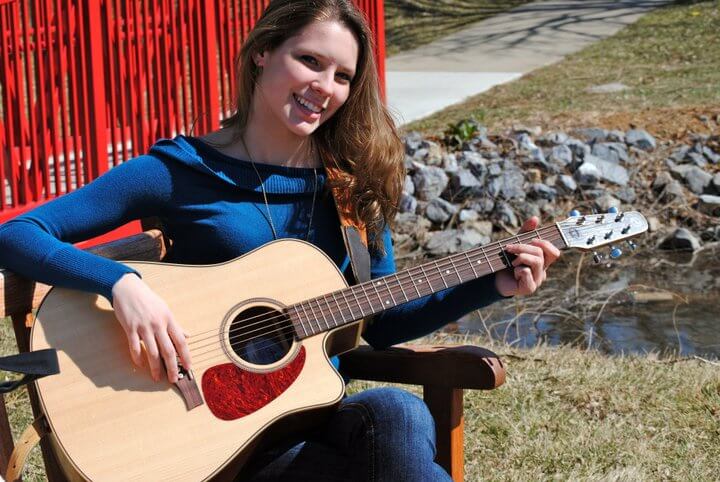 Making a Difference
Making a Difference
For Woodward, it’s about making a difference in somebody’s life through music.
That we are able to make a connection to music together is a really cool feeling to have. When you are making music with somebody else, you can’t explain what happens in that moment, but it’s a different connection you can’t make in any other way, and it’s a powerful connection.”
Sara Woodward ’14
As a neurologic music therapist, she has a deep understanding of how music interacts with the brain and how people can use music to maintain or rehabilitate their functional skills, fine motor skills, memory and speech.
One part of her job is short-term rehabilitation, where she works on improving a person’s physical mobility through music. This can be as simple as playing an instrument to improve strength and coordination or as complicated as using live music to stimulate gait patterns. Woodward does this by matching the beat of the music with the beat of someone’s gait. Then, over time, Woodward systematically changes the music to incrementally change and improve the person’s gait pattern. She often co-treats these patients with physical or occupational therapists or works with the help of nurses.
Woodward also uses music and cognitive stimulation to maintain and improve memory. Using familiar music from a person’s past can help trigger other memories, like the day they got married or something special about their spouse. Playing music and singing songs also helps dementia patients remember daily activities, like brushing their teeth, dressing or bathing. And playing familiar tunes can make those with anxiety or challenging behaviors more comfortable in a stressful situation.
Part of Woodward’s job includes conducting an intergenerational program in which the pre-schoolers from the nearby Goddard School attend the retirement facility two times a month to create music together. Through the program, the preschoolers become more comfortable with the residents and the residents connect with the preschoolers. This fall, both residents and students will participate in a musical together.
Shenandoah Director of Music Therapy Tony Meadows, Ph.D., called Woodward a “talented and hard working music therapist who has significantly impacted the program quality at Ingleside.”
Her intergenerational performance program is a unique and innovative undertaking that improves the quality of life of the residents she works with. I’ve been excited and proud to see how progressive and creative her programming has been over the past two years.”
Dr. Meadows | Coordinator of the university’s graduate music therapy program and associate professor of music therapy
Woodward said the patients she works with are still looking for ways to contribute to society. When she created a community bell choir with the residents, many were able to find a purpose by performing in church services, on holidays or during parties.
“They still want to do things even though they might not be able to physically and mentally do the things they used to,” Woodward said. “It’s also about living their lives to the fullest and feeling like they are able to love and be loved all the way to the end. Music, a lot of times, is a really good way to allow families to create these connections with loved ones in a very unique way.”
Woodward grew up learning piano and singing. As a music therapy major, she not only had to take music classes, she also had to take courses in anatomy, physiology, psychology and more. As part of obtaining her Bachelor of Music Therapy, she did an undergraduate major in voice and a minor in piano.
There are currently 85 students in Shenandoah’s undergraduate and graduate music therapy programs.
